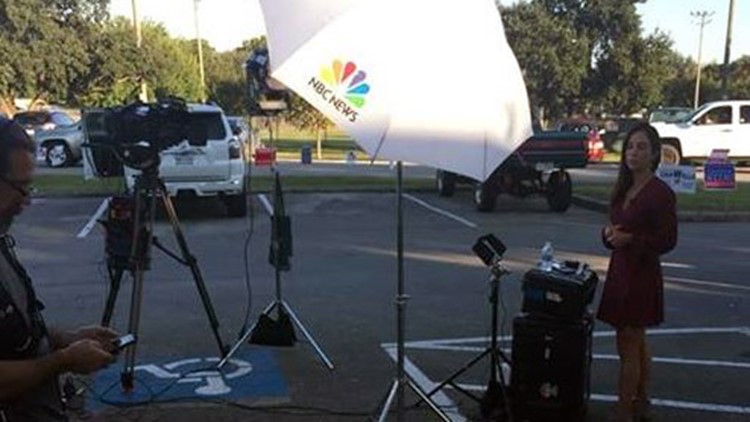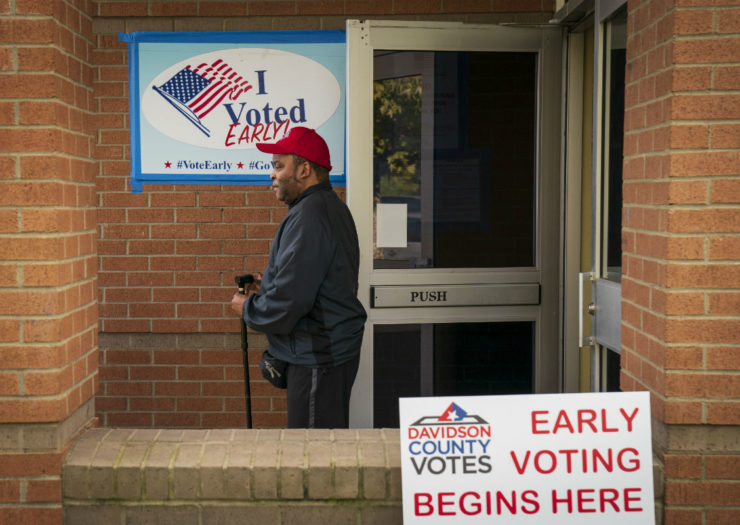Voter Suppression Isn’t New for Disabled Folks

A disabled Air Force veteran posted photos online of an MSNBC news crew blocking handicapped parking outside an early voting place in southwest Houston Tuesday. (James Berrie)
Homer, Michelle
Disabled Houston veteran: MSNBC crew blocked handicapped spots at polling place - A disabled Air Force veteran with MS posted photos online of an MSNBC news crew blocking handicapped parking outside an early voting place in southwest Houston Tuesday.
He and his wife, Sarah, drove their van to the center for early voting. When they arrived around 8 a.m., the couple saw MSNBC blocking the only van accessible parking spot. So the Berries parked in a back lot. Cars crammed around the couple’s van left little room for Berrie’s ramp and power chair to move.
“I didn’t even know what to do or to say because I was just shocked,” he said.
Berrie, who has multiple sclerosis, said the crew agreed to move when confronted. However, 15 minutes later when the couple finished voting and returned outside the crew remained.
“They had made no effort whatsoever to move,” Berrie said. “Their job is more important than accessibility. There were so many other places to do (their live shot). But you chose to do it here. We’re like, 'No. We gotta stand up.'"
The couple asked MSNBC’s crew to move again. Even with help from a group of firefighters standing nearby nothing changed, Berrie said.
“(The MSNBC crew) kept coming back like we’ll move in two minutes,” he said. “We’ll move in like three minutes. We’re going live. We’ve got a shot. We’re going live in like three minutes. We gotta do this and we’re just like, 'No. You have to move. It’s not right. You know it’s not right.'”
Berrie’s wife said a producer even kneeled on the ground at one point and begged for more time.
MSNBC offered no comment to KHOU 11 News.
---
Voter Suppression Isn’t New for Disabled Folks - 35 million eligible voters with disabilities could find their journey to the polls littered with obstacles.

As the demographic most affected by looming changes to health care, disabled people require a voice in who their elected leaders are to be.
Drew Angerer / Getty
Another hurdle to the polls is the perception of disabled people as individuals incapable of making decisions about their futures. According to Pew, an estimated 1.5 million adults are under guardianship nationally, though state laws about voting and guardianship can vary. In California, for example, NPR reported in 2016 that more than 30,000 disabled people have lost their right to vote due to state guardianship laws in the last decade. Guardianships have little to do with whether someone is competent to make decisions such as whom to vote for; rather, they are for disabled people who need help managing their household, medical needs, and finances. While many disabled folks enter into guardianships with their consent, courts, family members, and social workers can claim a disabled individual requires guardianship at any time. Because of this, disabled people in California and other states with similar laws can find themselves before a judge fighting for the right to cast a ballot. In Los Angeles County, a legal expert at the Spectrum Institute found after surveying six months of court documents that 90 percent of the developmentally disabled placed under conservatorship had lost the right to vote...
Some states have made strides in voter accessibility. Thirty-seven states allow early voting, and all states will provide absentee ballots for constituents who request them. In 20 states, however, an excuse for absentee ballots is required—and providing proof of that excuse can be logistically prohibitive for a population that already struggles to access society...
With the Affordable Care Act on the tip of every constituent’s tongue, a lack of access to the vote can prove deadly to disabled people: They will likely be the population affected immediately and most severely by federal changes to the law. This can have a cascading effect on everything in a disabled person’s life—from jobs to housing—pressing more into poverty. As of 2013, nearly a third of disabled people lived at or below the poverty line.
Never a community to wait on the wills of others for change, activists with disabilities have taken it upon themselves to educate one another on policy issues. At the start of the 2016 presidential race, Alice Wong, Gregg Beratan, and Andrew Pulrang teamed up to create #CripTheVote, a social media movement that gave voice to the interests of the disabled. National ADAPT, an organization that assembles members for local and national initiatives, is credited with halting the repeal of the ACA by camping out in Mitch McConnell’s office...
For those looking to be allies to the disabled community, the nondisabled should fight inaccessibility wherever it exists—and not just during election years. If voters should come across inaccessibility at the ballot, the U.S. Department of Justice has resources for quick fixes that can be enacted by poll workers; it is recommended, however, that problems be reported to the voting office for your state or county. Wherever possible, seek out the advice of nonpartisan voter advocacy groups like the Election Protection Hotline.
Ableism is one of the mechanisms by which politicians suppressing the marginalized find themselves with a two-for-one deal. It would be incredibly naïve to underestimate the power of the disabled vote. At 22 percent, adults with disabilities are the largest minority in the country. They intersect with every race, national origin, sexuality, gender and political persuasion—and the community is growing with membership open to all.
But maybe more people know that than previously thought. Perhaps that’s the reason why so many polling places are inaccessible after all: to undercut the power of our vote.
Well at least in NY disabled people still have the right. I knew a girl from middle school who came to vote a year after I signed up as a poll inspector and her mom went in with her to the polls behind the curtain and all. Of course this was before they changed to the machine where you put the paper ballot inside after you fill it out but I'm glad she kept her right to vote.






